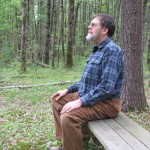So. Today’s the first day back from NEYM, and I’m finding myself puttering around the house, doing little, unimportant, quiet things–vacuuming up the dog hair that accumulated while we were gone, cleaning the kitchen, sorting bills, browsing the web. I’m not getting myself in gear for that trip to the library I’d planned, or the trip to the grocery store we need, and the rpg our friends at Peace Frog run won’t be meeting tonight after all. I think maybe a day of slowing down is not such a bad thing–Yearly Meeting was almost feverish with new experiences.
I think it’s part of how I do newness that I go through an almost paranoid period, feeling off-balance. I certainly went through it as I became a parent, as I became Pagan, as I left psychotherapy and became a teacher… even each time I’ve adopted a new dog. Things that are important to how I experience my own identity shake me up as each new change settles into place. I’ve already been through some of that, when I became Quaker, but so much else was going on that the feelings of upheaval really did seem normal. Anyway, all that is preamble. My point is that, this summer, I think I’m feeling a change in my Quaker self, and in how my Pagan identity entwines with that. It’s not done yet, but I think the verbal confusion I’ve had with the words in conversation (misspeaking and saying “Quaker” when I meant “Pagan” and vice versa on many occassions now) is a signal of a time of changes. And NEYM seems to have been some kind of a threshold around my sense of myself as a Quaker among Quakers. (Accepting, and really committing to, a committee appointment has been huge, too.)
At this point, perhaps I should insert a wierdness alert for the Quakers in the audience. I’m going to work with a fair amount of Pagan vocabulary, and it may sound kind of peculiar from here in. Just letting you know.
I realized at one point that this six days (four full days and two travel days) was the longest period of time I’d spent in a sustained altered state since my first Twilight Covening. I don’t think that that’s how most Quakers would describe it, or even that that’s how everyone there would have experienced it. But I was really, really working to stay, if not in worship, worshipful, most of the time I was there, and certainly all the time I was in the Meetings for Worship, Meetings for Worship for Business, worship-sharing groups, and workshops. Peter and I also celebrated a full moon at the event, and though our celebration was no more than burning candles to the moon down by the pond, it was a very numinous moment for me.
As with Drawing Down the Moon, there were times when I felt sort of stretched by what I was experiencing. I remember, when I first Drew Down, when I opened my eyes after the chant, and looked around the circle at my coveners, it was as if they were each of them limned with gold, shining with their individual dearness. I felt how much She loved and yearned for each of them. And though that was not a prolonged encounter, it left me staggering around for days, as my sense of the world changed in a hundred little ways. That is not an experience that has been repeated, at least with such strength, on many occasions. However, sitting in silence with a hall full of 200–600 or more Quakers, there were times when that experience came back in waves of great, intense tenderness. Quakers talk of the Light–and, as a Pagan, I know that shadow and night is as sacred and as much a part of life as light and day is. But despite that, I have to say that this experience, like most of mine in Quaker meeting _and_ of the Drawing Down, was not of shadows or night at all–it was a flood of… bright, bright, brilliantly bright light.
It was not, for me, personified in the way that Drawing Down the Moon is. I will say, though, that in addition to the sense, within worship, of that overwhelming Light that I have associated with the Goddess*–though not, as I say, with any clear sense of personification–I felt as if Herne, the God of wild things whom I especially love, were very close to me several times as I moved about between worship sessions. It was not a verbal sense, and it was usually outside of worship rather than during it, but I almost felt as if He were walking next to me or behind me through the halls and across the campus.
It was wild. It was also unexpected. I had concluded long ago that Pagan worship and Quaker worship, though complementary, are different. I don’t seek out the Pagan Gods when I’m in MFW (though sometimes they find me there). I wasn’t particularly looking to find them at YM–though I have been yearning for a way to knit together the colors of my religious experience.
Part of what was happening was surely about how open I was.
Peter and I, for instance, are always happy to be together, but I can’t remember when I’ve been so delighted to be in my husband’s company. Partly it was the joy (and relief!) of having someone to talk to who understands all of my vocabulary and history, but mostly, it was just plain joy. It was, I found myself thinking, good to have one part of the whole loving cosmos that I could spontaneously throw my arms around and kiss without causing anyone to become afraid!
I’m not used to so much spiritual work at a time. I’m not used to carrying myself so openly for so long at once. It was tiring. And, at times, it did overwhelm me. I remember how, after the rise of a meeting I found particulary powerful, how I couldn’t stop giggling and joking and talking. I don’t know if I would have looked manic or ungrounded to another person. But I knew I was over the edge of what I could carry in a sustained way.
And, of course, I didn’t sustain it at that level for the whole time. By the time I’d been there for three days, I was way past the duration of this kind of work that I’m used to, and I had reached the stage where the amazing, delightful, inherently loveable people around me were really starting to tick me off. They were, after all, still human, and so was I. The last two days of my time at NEYM, I had to work for my feelings of loving-kindness, because I’d started to notice every last character flaw in the men and women around me. I was also struggling with feeling pretty unloveable and paranoid myself.
One way to talk about what I was going through would be to say that I was passing from the stage of pseudo-community into a sense of real community. And, without doubt, the people I already knew from Mt. Toby who were there came to seem less and less distant and imposing, and more and more like personal friends I could trust with the reality of who I am: talkative, quicksilver, sometimes arrogant, and probably tiresome more often than I’d care to know. But we had some _real_ conversations, and I think I’m going to stay feeling close and connected to many of them as friends, not just Friends. It’s such a relief. The paranoid part of this transformation is, I hope, over, and it’s time to settle into being in ordinary human relationship, neither idealizing the members of my community as saints, nor fearing them as strangers.
—————————————-
As if to punctuate that last paragraph, I got a call from Lisa, a Ffriend I spent a very happy time getting to feel truly comfortable with, who had gotten a flat tire only a few blocks from my home. I kept her company while we waited for the AAA guy, and I’m happy to report she’s just as easy to talk to out in the world as at YM.
Perhaps more later. Worth writing about: Micah 6:8; That Tarot spread. Peter and the crowing of the cock/Gawain and the Green Knight. Knocking on the door, and the escape from pseudo-community.
—————————————-
* I frequently refer to “the Goddess,” which is a term that somewhat distorts my lived experience of Her. Lots of Wiccans and Pagans are Goddess-centered monotheists who focus on a single Great Mother (what a friend of mine once referred to as “Yahweh in drag”). I’m not one of those–nor am I a pure polytheist, believing that the sacred is subdivided into many clearly distinct and separate Gods and Goddesses.
Anyhow, even though it would map very easily onto liberal Quaker thought, “the Goddess,” when I refer to Her, isn’t a single supreme being. I call Her that to avoid trying to give Her–the Goddess or Goddesses I personally commune with–any single, specific name. The only time I ever asked Her for a name, She replied, in tones of great amusement, “You can call me Rosy,” which may have been an allusion to the ritual in which a priestess invokes Her: “By Thy rosy love, descend Thou unto the body of Thy servant and priestess here.” In other words, I think she meant to say, “I’m the Goddess you been hangin’ out with, honey–you really think you can give me a name that _means_ something as big as I am? In your dreams, sugar!”
So I can’t give Her a name. And saying “my Goddess” really, really doesn’t feel right–as if She belonged to me? Sometimes, among friends (small f, and Pagan) I do call Her “Rosy.” But like you’d have understood that one, if I’d used it when I mentioned Her for the first time five paragraphs ago?
Language can be so limiting! (In spite of how much of it I have poured out here.)











